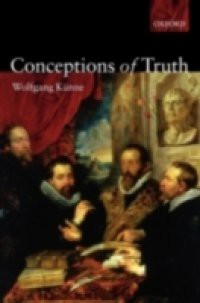Truth is one of the most debated topics in philosophy; Wolfgang Künne presents a comprehensive critical examination of all major theories. Conceptions of Truth is organized around a flow-chart comprising sixteen key questions, ranging from 'Is truth a property?' to 'Is truth epistemically constrained?' Künne expounds and engages with the ideas of many thinkers, from Aristotle and the Stoics, to Continental analytic philosophers like Bolzano,Brentano, and Kotarbinski, to such leading figures in current debates as Dummett, Putnam, Wright, and Horwich. He explains many important distinctions (between varieties of correspondence, for example, between different conceptions of making true, between various kinds of eternalism and temporalism) which have so far beenneglected in the literature. Künne argues that it is possible to give a satisfactory 'modest' account of truth without invoking problematic notions like correspondence, fact, or meaning. And he offers a novel argument to support the realist claim that truth outruns justifiability. The clarity of exposition and the wealth of examples will make Conceptions of Truth an invaluable and stimulating guide for advanced students and scholars in metaphysics, epistemology and the philosophy of language.

